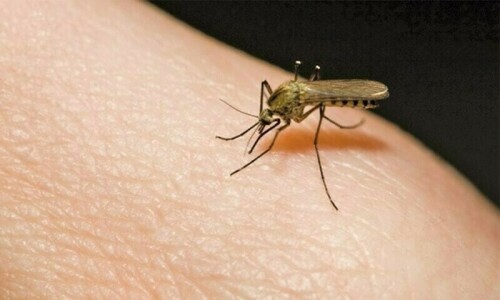RAWALPINDI/LAHORE: As dengue cases continue to rise in the garrison city, the Punjab government has declared a health emergency in Rawalpindi to curb the spike after 103 new cases were reported in the city on Tuesday amid fears of an outbreak of the disease.
So far, Rawalpindi has reported six deaths and a total of 1358 cases during the current season, out of which 1169 had been discharged after successful treatment, while 181 are under treatment in different hospitals. Lahore has merely reported 201 cases since Jan this year.
In a meeting held at the Civil Secretariat in Lahore, the Cabinet Committee on Prevention of Dengue, Infectious Diseases and Disaster Management reviewed the dengue situation, especially in Lahore, Rawalpindi, and Faisalabad.
Punjab Minister for Specialised Healthcare Khawaja Salman Rafique and Chief Secretary Punjab Zahid Akhtar Zaman presided over the meeting while Minister for Primary Healthcare Khawaja Imran Nazir participated through a video link.
103 cases reported in garrison city as minister shares plan to double bed capacity
The cabinet committee directed that special attention should be given to the clinical management of dengue patients to minimise the mortality rate and the technical group should determine the causes of deaths due to dengue in Rawalpindi and the severity of the disease in under-treatment patients.
Mr Rafique said that arrangements should be made for the treatment of dengue patients in private hospitals in case the public hospitals run out of space. He also issued instructions to start a special campaign to increase awareness about dengue.
Mr Nazir said that an action plan should be prepared for the next month to control dengue.
He said that the situation of dengue in Lahore was better due to efficient surveillance but there was a fear of an increase in cases in Rawalpindi.
The chief secretary directed that the capacity of government hospitals in Rawalpindi be increased for better treatment of dengue patients.
He said all necessary resources would be given for providing medicines and necessary facilities in public hospitals. Mr Zaman said that the availability of authentic data was very important for better planning.
Primary and Secondary Health Secretary Nadia Saqib and the deputy commissioner Rawalpindi gave a detailed briefing at the meeting.
Ms Saqib claimed that 1724 confirmed cases of dengue and seven deaths had been reported in the province so far this year. Rawalpindi alone accounted for six deaths.
Rawalpindi deputy commissioner said that 29 private hospitals have been put on standby as an alternate arrangement in case of emergency. He added that 142 private clinics had been sealed for not reporting dengue patients.
Anti-dengue meeting in Pindi
Minister for Primary and Secondary Healthcare Imran Nazir visited Rawalpindi and chaired an anti-dengue meeting on Tuesday to review the anti-dengue activities of allied departments.
“We have to use all means to sensitise people to report to the hospital immediately in case of fever or other symptoms. The longer they take to report to the hospital, the more critical the case will become, and the more difficult its treatment will be,” he said.
He said that the district health officers should ensure that the private laboratories and health practitioners immediately refer the patients to the main hospital if they find symptoms of dengue fever and report it to the health department.
“It is the most important need of the hour to turn the casual attitude of the people towards dengue into a serious (one). For said purpose, the political figures should be mobilised at the ward level to go door-to-door to sensitise residents,” he said.
Khawaja Imran Nazir further said that there should be no negligence in the treatment of dengue patients. He said at present, the province was going through the ‘peak dengue season’, adding that the government had made a plan to increase the capacity of beds in hospitals from 300 to 600 to deal with any sort of emergency.
He directed that the hospital administration should ensure that the heads of the departments in the dengue wards and the consultant personally visit the critical dengue patients at least three times a day. He further said that we have made a plan to increase the capacity of beds in hospitals from 300 to 600 in order to deal with any sudden situation.
Giving a briefing on this occasion, Deputy Commissioner Dr Hassan Waqar Cheema said that in anti-dengue activities, Islamabad and Chaklala and Cantonment boards were also working with the administration. Since January, at least 3,490 FIRs and 2301 challans had been issued whereas 1373 buildings had been sealed. Rs1,612,900 in fines had been imposed as well.
Published in Dawn, October 2nd, 2024














































